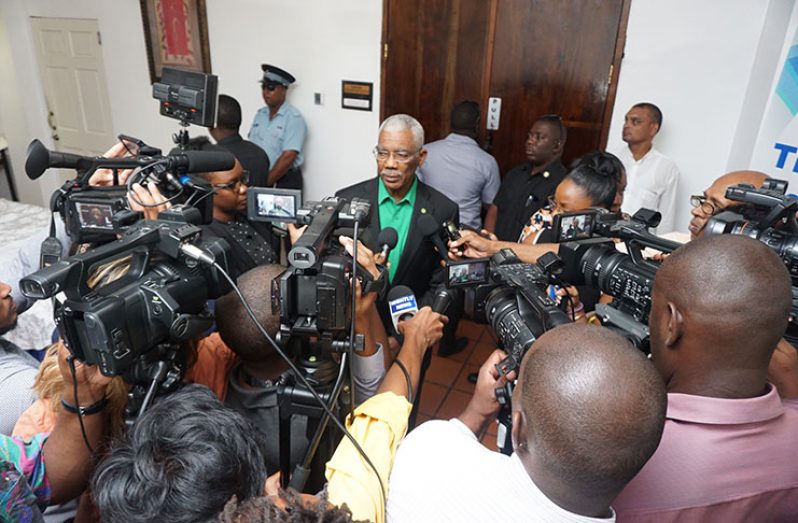…President Granger
THE method of selecting the Prime Ministerial Candidate to run alongside President David Granger, in the next General and Regional Elections, is under active discussion as the A Partnership for National Unity (APNU) and the Alliance For Change (AFC) revise the 2015 Cummingsburg Accord.
Though the AFC has submitted its Leader, Khemraj Ramjattan, for the position of Prime Ministerial Candidate, President Granger said a decision, on that proposal, has not been made to date as the revision of the Cummingsburg Accord is still ongoing.
“I cannot say now, who I will be running with but…I can assure you that the two groups are reviewing the 2015 accord and we hope to come up with a revised accord,” President Granger told reporters on the sidelines of an education forum at the Pegasus Hotel on Thursday.
The revised accord will detail the method of selecting the prime ministerial candidate. Under the 2015 Cummingsburg Accord, which brought the two political parties together as a coalition on February 14, 2015 ahead of the elections, the APNU nominates the presidential candidate and the AFC, the prime ministerial candidate. Added to that, APNU was allocated 60 per cent of the seats won by the government in the National Assembly while the AFC received the remaining 40 per cent.
Notwithstanding these facts, President Granger underscored the importance of adhering to the Constitution. “The major aspect is that the two groups – the APNU and the AFC – should abide by the Constitution of Guyana that is the principle foundation of any agreement. Nothing in the accord should collide with the Constitution,” he told reporters.
Thus far, the negotiating teams have agreed to the core principles that will guide their union as this country gears up for general and regional elections. Last September, the teams exchanged their proposals for various amendments to the accord. It was agreed by both sides, that the accord must be in accordance with the Constitution. In the previous accord, the parties had agreed that Prime Minister, Moses Nagamootoo, would chair cabinet, but later this proved problematic as according to the Constitution, cabinet must be chaired by the President unless he is out of the jurisdiction or unable to perform the function. There have been suggestions that the President could delegate this responsibility even if he is in the country.
This newspaper also understands that as part of the core principles, the parties agreed and committed to the establishment of a system of inclusionary democracy and the advancement of the country’s Green State development Strategy: Vision 2040.
They also committed to seeking electoral majorities at the general and regional elections and local government elections and agreed to select candidates for the upcoming elections through participatory and transparent processes which guarantee that candidates enjoy the majority of their respective constituencies and satisfy all legal criteria for election.
On the issue of allocation of seats in the National Assembly, Cabinet, Regional Democratic Councils, Municipal and Neighbourhood Democratic Councils, the sides agreed that this would be done on the basis of a formula. The sides agreed too that the prerogative of the President to appoint members of cabinet and ministers and to assign specific ministerial portfolios is explicitly embodied in the Constitution and is inviolable.
Meanwhile, other aspects of the core principles include the cultivation of respectful relations and at all times the parties will act collectively in the best interest of the coalition. They also agreed to speak with one voice on issues of public policy, to support a common manifesto and to issue joint media bulletins and releases on electoral matters.
Added to that, the parties agreed to abide by the principle of collective responsibility in respect of decisions emanating from Cabinet and to holding common positions on bills, motions and resolutions in the National Assembly. Each party also pledged to inform the other in advance of its inability at any time to support any measure in the National Assembly.
Other areas covered in the core principles are that of the publishing of a joint manifesto comprising 12 broad fields: constitutional reform, good governance, economic growth and development, education improvement, energy sector, environmental protection, Indigenous Peoples, infrastructural development, international relations, social protection and social cohesion, security and human safety, women, gender equality and youth. The parties agreed to jointly finance their elections campaign and also to campaign vigorously either on their own or collectively in each contested constituency.




.png)









